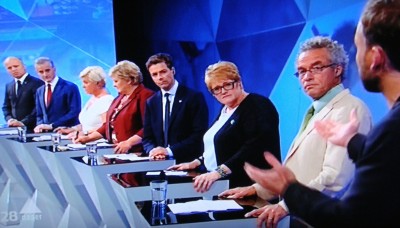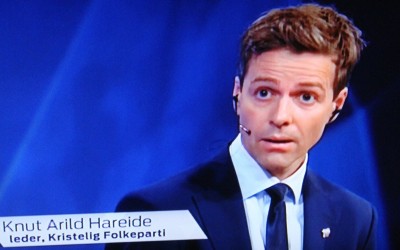The auditorium was packed, hundreds of thousands of Norwegians were tuned in nationwide and issues abounded as the leaders of all eight political parties represented in Parliament sounded off in Arendal Monday night. Their first major debate of the campaign season, hosted by state broadcaster NRK, brought harsh accusations as well as laughter, and only one of those participating is even on a ballot in the upcoming municipal elections.

Commentators later referred to the debate as “robust’ and informative, with an engaged audience in the background.
Liberal Party leader Trine Skei Grande, a Member of Parliament who’s also on the ballot in Oslo, was the first to go on the offensive. After all the party leaders had been given an opportunity to describe how they think new jobs can be created at a time of rising unemployment and calls for a shift away from oil in Norway, Grande fired things up by hurling a direct salvo at Labour Party leader Jonas Gahr Støre. He’d just criticized some of Finance Minister and Progress Party leader Siv Jensen’s views on job creation and prospects for the oil industry when Grande went on a spontaneous attack, claiming that far too many environmentally oriented companies were allowed to go bankrupt during the last Labour-led government’s eight-year term in office. That’s when Støre was both foreign minister and health minister, and a close ally of former Labour Prime Minister Jens Stoltenberg.
“Dear Jonas Gahr Støre, dear Jonas,” Grande began sarcastically, going on to say that she’d much rather hear Jensen’s views, even if she doesn’t agree with all of them, because “at least she has a (clear) opinion and does something, you have to do something,” Grande all but shrieked at Støre, to applause from the audience. Støre has been criticized lately for waffling on everything from oil and gas production to environmental policies and municipal reform that encourages mergers among local governments. Støre also has been described as weak in political debates, and while most commentators agree he performed better on Monday night, he lacked the charisma or confidence of some of his political rivals on stage.

It was arguably the leaders of the small parties, like Grande’s Liberals and Knut Arild Hareide’s Christian Democrats, who performed the best during the debate, which covered jobs and economic diversification, whether all stores should be allowed to do business on Sundays, municipal reform and how Norway should respond to the refugee crisis. Hareide and Jensen, who had several direct confrontations not least over the refugee issue, were widely viewed as being the winners in the debate. Even Audun Lysbakken, whose now-tiny Socialist Left party (SV) has lost most of its voter base in recent years, drew applause from the live audience for many of his stands, not least when he declared that “It’s Siv Jensen who’s the refugee here,” as she defended how she’s trying to balance government loyalty while catering to her party’s largely anti-immigration membership.
It was clear the small parties wanted to be heard, with Trygve Slagsvold Vedum of the Center Party claiming that Jensen had betrayed her own voters on tax relief promises, only to be met with Jensen firing back with “That’s wrong! That’s wrong!” Few attempts were made to hide the hostility between them, while Hareide of the Christian Democrats succeeded in getting everyone to laugh on several occasions, not least during a duel with Jensen over Sunday store openings. He’s against it, she’s firmly in favour, stressing that it’s important to allow Norwegians the freedom to shop when they want.

Some of NRK’s own commentators believed that Jensen overshadowed Prime Minister Erna Solberg, leader of the Conservative Party, in the debate. Solberg maintained her unruffled style and calmly asserted that she’s in charge of the government coalition with Jensen’s Progress Party, but that each party must be allowed to express their own opinions on issues, not least during an election campaign.
While all the party leaders are politicians at the national level and aren’t personally running in the upcoming local elections, it was important for them to define their parties’ stands. Local candidates are expected to follow the party line, with some flexibility, at the local level, where politicians are directly responsible for their communities’ schools, nursing homes, day care centers, local health care clinics and a host of other services. They receive state funding, but decide how it’s spent, which is why many in Norway feel the mid-term local elections are more important to residents’ everyday lives than national elections. The election is set for September 14, and legal residents who aren’t Norwegian citizens are also eligible to vote.
newsinenglish.no/Nina Berglund

